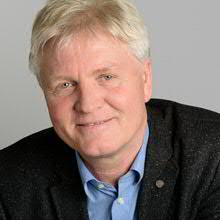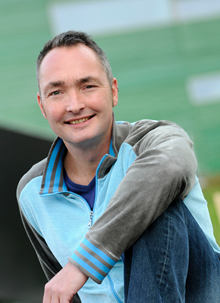Two European Advanced grants for biochemical research
Two researchers from the Faculty of Science and Engineering (formerly known as the Faculty of Mathematics and Natural Sciences) of the University of Groningen have been awarded an ERC Advanced Grant of EUR 2.5 million each. Professor of Biochemistry Bert Poolman will build a synthetic cell in order to simulate and study the volume regulation of a living cell. Professor of Molecular Dynamics Siewert-Jan Marrink will develop new simulation techniques that will enable him to study the structure of cell membranes in detail. Both research projects will run for five years.
It is essential that living cells are able to regulate their volume properly. If they dry out, or conversely if they contain too much moisture, the conditions in the cell change. These conditions include the acidity or the density of large molecules (the crowding of the cell). This has an effect on numerous processes, such as the metabolism.

Professor Bert Poolman of the Enzymology group (Groningen Institute Biomolecular Sciences & Biotechnology) has spent years researching how exactly a cell controls its volume, and his research group has discovered various regulation mechanisms. He will now make a synthetic cell with a cell membrane made from fatty acids (lipids) and different transport proteins. Inside will be an enzyme network that can produce ATP, the universal fuel for cells, for a long span of time.
In this model system, Poolman wants to study how different components work together in a system that approximates the workings of real cells. This will generate new information about the regulation mechanisms that cells use to maintain a constant volume under circumstances that are prone to sudden change. Poolman hopes to use this information to make more complex artificial cells in the future that can be used as miniature factories for the production of useful substances.
Poolman receives the Advanced Grant for his five-year project entitled "ABCVolume: The ABC of Cell Volume Regulation".

Professor Siewert-Jan Marrink of the Molecular Dynamics group (Groningen Institute Biomolecular Sciences & Biotechnology) also focuses on cells: he uses simulation techniques to analyze the interaction between the various proteins and fatty acids in the cell membrane. Classic biochemical analyses are not suited to this, because cell membranes are not homogenous but contain numerous different nanodomains that are too small to study separately.
Scientists therefore work with simulations that depict the interactions between the different molecular building blocks (this is known as ‘computational microscopy’). There are very detailed simulations at the atomic scale, which require a huge amount of calculation time, and less precise ‘coarse-grained’ simulations that simulate groups of atoms. These provide less detailed information, but at a much faster rate.
Marrink is going to develop a new simulation technique with a ‘zoom option’ that will enable him to zoom in or out at will depending on whether he wants details or speed. He wants to use this technique to research what makes proteins in the membrane behave differently and start to cluster, for example. He should then also be able to discover how the composition of fatty acids affects the functioning of a cell membrane. Marrink and Poolman have worked together on aspects of their research for years and will continue to do so with their ERC programmes in order to further unravel the dynamic interactions between lipids and transport proteins in biological membranes. ‘The combination of computational and experimental approaches is an extremely powerful way to achieve this.’
Marrink receives his EUR Advanced Grant for the five-year project entitled "COMP-MICR-CROW-MEM: Computational Microscopy of Crowded Membranes".
| Last modified: | 06 February 2017 3.46 p.m. |
More news
-
15 April 2024
Single-molecule engineering niche in Gravitation research
With her expertise in single-molecule techniques, Dr. Kasia Tych (GBB) will contribute to a big Grvitation-research programme
-
15 April 2024
Night vision with artificial atoms
Every two weeks, UG Makers puts the spotlight on a researcher who has created something tangible, ranging from homemade measuring equipment for academic research to small or larger products that can change our daily lives. That is how UG...
-
09 April 2024
University of Groningen to become member of the 4TU Stan Ackermans Institute
Through this membership, the two EngD programmes in Autonomous Systems and in Sustainable Process Design at the Faculty of Science and Engineering will be added to this partnership with the 4TU from September 2024
